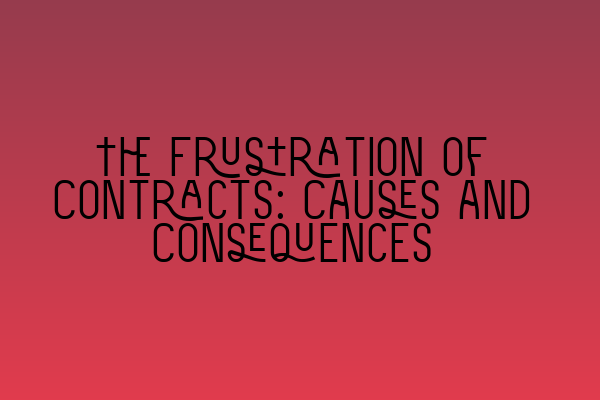The Frustration of Contracts: Causes and Consequences
Welcome to the SQE Contract Law blog! In today’s post, we will be discussing the frustration of contracts and exploring its causes and consequences. We will dive deep into this topic to provide you with a comprehensive understanding of what frustration means in the context of contracts. If you’re interested in mentorship for aspiring solicitors, legal challenges and pitfalls, or starting your legal journey, check out our related articles Mentorship for Aspiring Solicitors: Nurturing Talent in the Legal Field, Legal Challenges and Pitfalls: Navigating the Complexities of the Legal System, and Law School in the UK: Your Guide to Starting Your Legal Journey.
What is Contract Frustration?
Contract frustration occurs when unforeseen events render the performance of a contract impossible, illegal, or radically different from what the parties originally intended. These events may arise due to external factors beyond the control of the contracting parties, such as acts of nature, government regulations, or war.
Causes of Contract Frustration
Several factors can contribute to the frustration of a contract. One common cause is the occurrence of an unpredictable event that makes it impossible to fulfill the contract’s obligations. For example, a concert venue may be destroyed by a fire before a scheduled performance, rendering the contract between the venue and the artist frustrated.
Additionally, changes in the law or government regulations can lead to contract frustration. Suppose a new legislation is enacted that prohibits the sale of a certain product. In that case, any existing contracts for the sale of that product would become frustrated because performance is now illegal due to the change in regulations.
Consequences of Contract Frustration
When a contract is frustrated, it is considered to be discharged, meaning the parties are no longer obligated to perform their respective duties under the contract. The frustration acts as an automatic termination of the contract, relieving the parties from any further obligations.
However, it is essential to note that frustration does not provide a remedy for any losses suffered before the frustrating event occurred. It merely brings an end to the contract from the time of the frustrating event.
Upon the occurrence of frustration, any payments made under the contract might be recoverable by the party who made them. However, the court will consider various factors, such as the degree of benefit received by the party in question, before deciding on the extent of the recovery.
Conclusion
In conclusion, the frustration of contracts can arise from unforeseen events that make contractual performance impossible, illegal, or radically different from what was initially intended. The consequences of frustration result in the automatic termination of the contract and relieve the parties of their obligations moving forward. Remember to check out our related articles Striking a Balance: Work-Life Harmony in the Legal Field and Demystifying the Solicitors Qualifying Examination (SQE): What You Need to Know for further insights into the legal field.
